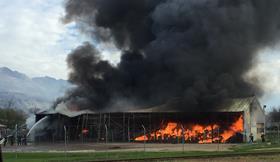
The damaging strike at leading South African apple and pear packing operation Ceres Fruit Growers (CFG), based in Ceres, continues into its second month with little sign of an agreement to end it in sight.
CFG says that despite ongoing negotiations since 22 July with the Food and Allied Workers Union (FAWU), no agreement has been reached to end the strike action.
“The accompanying intimidation of workers who want to return to work continues,” says Francois Malan, CFG managing director.
The strike has now also drawn comment from the industry body Hortgro, while it has emerged that a one-day strike in support of the CFG strikers has been held at other fruit concerns in Ceres. Hortgro spokesman Anton Rabe has admitted that there are concerns that the strike could spread elsewhere.
Hortgro says in its statement that it has learned that further protest action will take place on Wednesday 7 October in Cape Town and rural towns in the region.
“We have acted in good faith but have to believe now that FAWU and other non-stakeholders are using this normal industrial wage dispute to further their own agendas and cannot be seen to be acting in the interests of their members and CFG employees,” says Malan.
“CFG has been at a stand-still, we have suffered arson and continued intimidation. Despite our latest offer, which includes a package increase of 9.5 per cent, FAWU is dragging its heels. As one of the larger employers in Ceres, CFG and all our people and livelihoods are now at risk,” he adds.
Hortgro Chairperson Nicholas Dicey says in a statement that there is deep concern about the continued unrest, intimidation and even threats of arson at some packhouses in the Ceres area. Dicey says that he is extremely disappointed by the disconnect between multi-stakeholder discussions on national level versus what is taking place on regional level.
“Hortgro, as part of FruitSA, is one of the parties participating in the Fruit Industry Value Chain Round Table, established by the Department of Agriculture, with various government departments, labour organisations and the CCMA,' notes Dicey. 'Labour, labour welfare and a range of socio-economic rural issues have been identified by stakeholders as captured within the Fruit Industry Social Compact (FISC). The FISC addresses six key programmes through which the needs of business, workers and rural communities could be addressed cohesively. Integral in this process going forward is a Social Accord to be agreed between stakeholders currently facilitated by the CCMA.'
Dicey says that whilst these initiatives and discussions are ongoing, it is unacceptable that 'opportunists and those wishing to undermine the economic viability of the fruit sector in particular' continue to act in bad faith and deliberately incite unrest and criminal behaviour.
“We note with concern that the Western Cape economy – Cape Town and some rural towns in particular – will once again be targeted and destabilised via marches organised by, amongst others, Cosatu and FAWU this coming Wednesday (7 October) for reasons that have no bearing on the fruit industry,' he says.
'We acknowledge the right to strike and to march, but this must be done within the letter and spirit of legislation. Organisers must also be held accountable if such events end in chaos, violence, intimidation and destruction of property such as what has already been experienced in Ceres. The alleged bussing in of strikers and marchers, as well as setting fire to infrastructure and equipment in particular, is totally unacceptable and should be investigated to confirm who the perpetrators are.”
Dicey outlines that the fruit industry is sensitive to the many underlying rural issues that need to be addressed.
“These are not agricultural issues per se, but rural issues which require multi-stakeholder interventions and solutions,' he adds. 'The fruit industry is prepared and willing to engage and contribute towards such multi-stakeholder solutions in a constructive manner as envisaged and encapsulated in the Social Accord. The disconnect between industry-level discussions and agreements, and what is currently happening in targeted' regions, needs to be resolved for the benefit of all stakeholders. In particular this needs to be done for workers who have already experienced extensive loss of income, and rural communities in general.
“We trust that all parties will refrain from any unlawful and destructive behaviour and that much needed stability will return immediately to towns such as Ceres.”



